Opening the Magic of the Buddha’s Lists:
LDLs to Continue Teaching Series in 2021
Written by: Sooz Appel and Steve Wilhelm
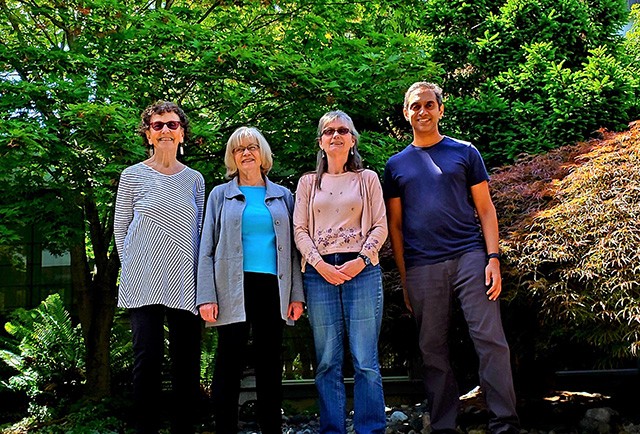
The seven Local Dharma Leaders presenting the series include Sooz Appel, Lauren Wilson, Lyndal Johnson, and Arvind Moorthy, pictured, plus Susan Alotrico, Jerry Harter and Steve Wilhelm, not pictured.
Photos by: Kalid Azad. Tenny Mallory-Canning, Marshall Lewis, Aravind Moorthy, Jade Petersma, Shevy Treichel
Monthly classes on the essentials of Buddhist teachings, based on the Buddha’s many lists, continue to be offered by a group of senior students from Seattle Insight Meditation Society.
The Buddhist Essentials classes offer students brief and accessible versions of significant Buddhist lists, each class crafted to make a difference in students’ actual lives. Each class, offered by a pair of senior students at 7 p.m. on consecutive third Wednesdays, is a combination of instruction and discussion with a bit of meditation for greater individual exploration.
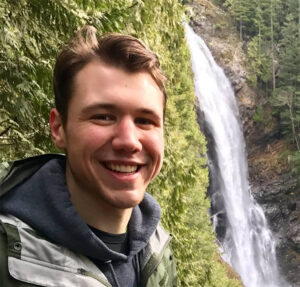
Matt Bailey at Wallace Falls, Washington.
The series complements the dharma explorations by Seattle Insight Meditation Society guiding teachers Tuere Sala and Tim Geil, on Monday evenings.
It’s no secret that the Buddha’s propensity for basing his teachings on lists can sometimes be dizzying to newer students. It’s also true that even the seemingly simplest of the Buddha’s lists contain fathomless depth, if students can get some guidance from people who have opened to those depths themselves.
“After completing the Introductory Meditation Class Series at SIMS, I was enthusiastic to learn more about the origins of the teachings I was hearing about, especially since my previous exposures to meditation and mindfulness had been very Western and secular,” said student Matte Bailey. “I have found the Buddhist Essentials Series at SIMS to be extremely insightful, and it is putting what I had previously learned over the last several years into context.

Gene Canning loves the outdoors, and the dhamma.
“While I had heard many of the core Buddhist teachings at some time or another before, I previously had trouble understanding what they really meant, and how they related to modern life. The Buddhist Essentials Series is really helping me see how relevant and helpful these teachings are, and I feel that it is really contributing to my practice.”
While the series was originally created for people practicing within Seattle Insight Meditation Society, usually referred to as SIMS, it is open to anyone wanting to better understand the Buddha’s core teachings.
The senior students, referred to as “local dharma leaders” within SIMS, in the classes explore lists including the three characteristics, the four noble truths, the five hindrances, the seven factors of awakening, the paramis, and the five aggregates.
In every case the pair of LDLs presenting a list have met together to explore that list more fully, and to devise ways their presentation will be engaging and relevant to students’ lives.
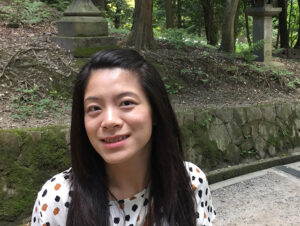
Valerie Tran, visiting temples in Japan.
“One of the benefits of the Buddhist Essentials is to hear the topics discussed by the Local Dharma Leaders sharing their insights and wisdom,” said Gene Canning, who has attended many of the classes. “By re-phrasing, re-telling, and putting into their own words their understanding and experiences, the LDLs reduce the complexity for less-experienced lay practitioners. It is like getting help from a big sister or brother.”
Participant Valerie Tran said the series has been very useful for her:
“I left feeling that I’ve learned what Buddha taught, and how to treat myself and others during times of stress. It was a great source on the Buddhist foundations.”
The series has become a continuing joy for the seven Local Dharma Leaders who have participated, and that enthusiasm shows.
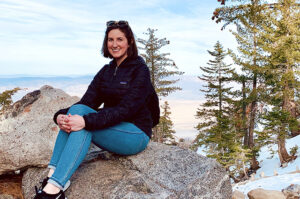
Kelby Hawn at the top of the San Jacinto Mountains in Palm Springs.
“The best thing has been working with the other LDLs to develop and prepare the classes,” said LDL Lyndal Johnson. “The feeling of being part of a team and the sense of sangha is great.”
The sum of the LDLs’ practice adds up to many decades of time on the cushion and in retreat. Their understanding gets deeply tapped during the classes, in collaboration with students. While the LDLs offered the classes in person the first year, nearly all the classes were offered via Zoom in 2020, which is continuing into 2021.
“The thing about the Dharma is that once is not enough,” said LDL Lauren Wilson. “These classes give people new to Buddhism an overview of some of the main teachings and some suggestions about how to practice with them. But it is not just the new people who are learning. I learn so much each time I prepare to teach, and each time I hear one of my colleague’s talks.”
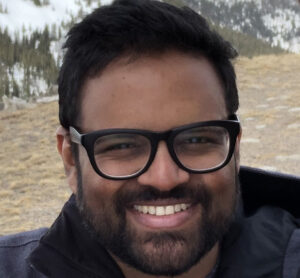
Halid Azad enjoys hiking, and the dharma.
While Zoom doesn’t give the same sense of visceral contact as in-person classes, it offers several advantages. These include welcoming people who don’t like Seattle traffic, who can’t drive at night, or who live far away.
In addition to the classes focused on one list, the LDLs have been offering daylongs, twice yearly, to bring deeper practice to the content offered in the evening classes. These daylongs are a combination of talks, sessions of walking and sitting meditation, and breakout sessions where students can gather in small groups.
“I started meditating regularly about a year ago, but my interest in Buddhism has grown over the past few months,” said practitioner Kelby Hawn. “The Buddhist Essentials classes at SIMS have been a fantastic way to learn more and develop my practice. The monthly talks and small group chats set a good pace to allow the teachings to sink in, and it’s fun to connect with others in the sangha.”
The first 2021 daylong, on Saturday, July 31, will focus on the Four Foundations of Mindfulness. The second daylong, scheduled for December, will focus on the Brahma Viharas.
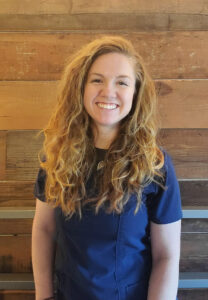
Shevy Treichel appreciates how the class relates to her own 21st-century life.
While the LDLs at one point considered calling the series “Buddhist Basics,” they instead decided on the name “Buddhist Essentials” because that better reflects the importance of these lists. People sometimes get the erroneous ideas that lists like the four noble truths are just for beginners, but actually fully awakening to any of them can be a profound turning on the path.
“I really enjoyed the Buddhist Essentials class. It was great hearing different perspectives from the teachers on the topic, and I still remember Anna (Ossenfort’s) rundown of the four noble truths during the first class,” said student Kalid Azad. “She clearly and concisely summarized the essence of the path in her opening talk, and it was a joy to experience.”
Student Shevy Treichel said the series is helping her move forward on the path:
“This series has been wonderful! As meditation has taken on deeper meaning for me it’s inclined me toward the teachings of Buddhism,” she said. “It was initially daunting to realize the breadth of information and challenging to grasp the full meaning in what I was learning.
“The Buddhist Essentials Series has provided me the framework to understand the basic concepts of Buddhism but more importantly it’s provided me a community with whom I can discuss and relate the teachings to my own modern existence. I highly recommend it to anyone looking to take those first steps down the middle path!”
Sooz Appel was introduced to Vipassana meditation in 1983 at a death and dying retreat with Stephen Levine, and later helped establish Shanti Seattle, which offered emotional support to people who were dying. Appel has had a varied career in local government and recycling and currently leases property to small businesses. She joined SIMS when it formed and served on the board and as president from 2001-2003. She is active in the SIMS death and dying group. Along with other Local Dharma Leaders and guiding teacher, Tuere Sala, Appel is part of the leadership and teaching team for SIMS’ Sunday Dharma and Meditation.
Steve Wilhelm has been meditating since 1968, and engaged in Buddhist practice since 1987. Wilhelm has facilitated Eastside Insight Meditation since 2000, and serves on the board of the Tibetan Nuns Project. He retired in mid-2016 from a 34-year career as a journalist, and currently edits Northwest Dharma News and recently finished editing a fourth Dharma book. In 2017 Wilhelm graduated from the fifth Community Dharma Leaders program, offered through Spirit Rock Meditation Center. He lives in Kirkland with his wife Ellen.
